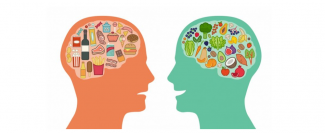Stress, Mental Health and Food

When it comes to stress, food has been identified as a coping mechanism and an important factor during this situation. Interestingly, food (in addition to self-care, sleep management, and exercise) has the potential to help reduce stress by helping regulate cortisol levels.
Cortisol is a hormone that is involved in various processes such as: sleep regulation, inflammation, blood sugar, metabolism of macronutrients (fats, carbohydrates, and protein) and controlling blood pressure. This hormone is commonly recognized as the “Stress hormone” since the adrenal gland releases it when there is a stressful situation, or the body is under physical stress.
In addition to this, cortisol, helps the body manage the fight-or-flight instinct. Therefore, we can all agree that cortisol is very important and healthy in the body for short periods of time. But, what happens in long periods of time, you may be asking yourself? Too much cortisol creates stress in your body, leading to an inflammatory response and increased blood pressure. This would be the opposite of all the good things this hormone can do for us in the short term.
It is key to have a mechanism in place to help your body manage stress. From the nutritional perceptive there are a few foods that help counter-balance the effects of long-term cortisol, such as anti-inflammatory foods.
An anti-inflammatory diet includes fewer processed foods and more whole foods. A good example is the Mediterranean diet, which includes fruits and vegetables, fish, poultry, whole grains and healthy fats.
Interestingly, this type of diet does not only help reduce stress but also it can help counteract chronic degenerative disease and more importantly, support mental health. Sugar and processed foods can lead to inflammation that can affect the brain, which may contribute to mood disorders, including anxiety and depression.
Food is so important for mental health. According to the American Psychological Association, gut bacteria produce an array of neurochemicals that the brain uses for the regulation of physiological and mental processes, including mood. The gut bacteria can be affected based on the diet we follow, the lifestyle we have and other environmental factors that we are exposed to. Therefore, to boost mental health is important to eat fruits and vegetables, whole grains, and healthy fats.
Lastly, pay attention to how you feel when you eat. Mindful eating is a powerful tool when it comes to stress management as well as mental health. Many of us don’t pay too much attention to what, when or why we eat. A helpful tip is to document what you eat, how you feel, and why you ate. This will help create awareness and also will allow you to identify when are you eating due to hunger or stress.
